COFI President Shares Optimism
Thursday, September 20, 2012 @ 2:43 PM
 Prince George, B.C. – It was an optimistic John Allan who met with members of the Prince George media this morning to talk about all things forestry including the moving of the Prince George COFI office.
Prince George, B.C. – It was an optimistic John Allan who met with members of the Prince George media this morning to talk about all things forestry including the moving of the Prince George COFI office. Allan is the President of the Council of Forest Industries and is in Prince George for a community dinner slated for this evening. He says the Prince George COFI office will move into the new Wood Innovation and Design Centre when it is completed in 2014.
Allan says forestry is starting to emerge from what he calls the “grim years” created by the crash in the U.S. housing marking. Not only are housing starts in the U.S. increasing, he is hopeful starts will be in the 1.5 million range within 4 years. “If we have housing starts at that level, we will see pretty good markets for lumber.”
But Allan says the U.S. housing market crash taught the forest industry a valuable lesion “We needed to diversify our markets, and we need to keep our markets diversified.” Allan says the reward for dedicating the industry to serving the U.S. market resulted in the U.S. “As a reward for that dedication to the U.S., they kept suing us through various ways and means over the last 30 years.” The good news says Allan is that there is no litigation underway at the moment “And that is a rare event, it’s like the passing of Haley’s comet, it comes around every 200 years.”
The good news moving forward, is that mills are now more efficient than ever “They’re the most efficient in the world and we are well positioned to take advantage of the market in the U.S.” Still, with the timber supply noted to be critical for some producers in the Cariboo, the lack of fibre supply could result in the loss of production which would be the equivalent of 8-9 mills.
COFI launched its own investigation into the two sawmill explosions and fires which left 4 people dead and dozens more injured and Allan says they are still waiting for results of test samples and the reports of the other investigations into those fatal blasts. “I’m very anxious to have a better track record on this front. WorkSafe (BC) has given us a directive to get our dust down to 1/8th of an inch or less in our mills and we’ve gone through a real rigorous training process in the mills to manage for dust. We don’t yet know if dust was the combustible in the mills, the WorkSafe investigations aren’t finished yet, but, it’s a likely culprit. Of course we don’t know yet what the ignition source was either, a control panel, a motor, whatever, but we should have those investigations completed by late fall.”
The switch from volume based forest tenure to area based, such as is planned for the Burns Lake region, has both pros and cons says Allan. “Some of our members would like to see area based tenure. The pro is you’re more like an owner than a renter and the old traditional story is, I rent a house I never fix the roof, I don’t paint it and it kind of falls apart unless the landlord comes in and does it. As you know the landlord in this case, the British Columbia government, has been criticized heavily by the Auditor General and by others, that they’re not doing enough on forest health whether its research inventory, silviculture etcetera.”
He says area based tenure had been tried in the past, and it was not successful . “I think we are in a position right now, that when it comes to timber supply, and we all know the number is not going up, its going down, that we have to look at every option we’ve got.” He warns that while those options should be explored, there is a need to proceed with caution especially on environmental fronts as the industry has fought long and hard to develop a positive environmental reputation “We don’t want to go back to the early 90’s where we had to bring in a number of initiatives to regain the market place.”
“We are all in this together, and in order to secure the future of forestry in B.C. I think we need to be seen to be looking at every possible option we can look at to address the downturn in timber supply.”
And then it all comes back to finding the people who want to work in forestry. During the grim years, many already in the industry had to pack up and take their skills elsewhere. With those who stayed, retirement is looming, and younger workers are needed to fill that retirement gap. Allan says forestry is not a sunset industry, and unlike mining or the oil and gas sectors, it has flexibility in where you want to work as there are forestry operations throughout B.C. “You don’t necessarily have to move to work in forestry. Mining is perhaps more remote, oil and gas is in the north east , so I think forestry has more flexibility.”
In a day when environmental issues are key, forestry fits that bill too says Allan, “A house, a building that’s environmentally friendly, that takes you to wood… every time.”

Comments
Comments for this article are closed.